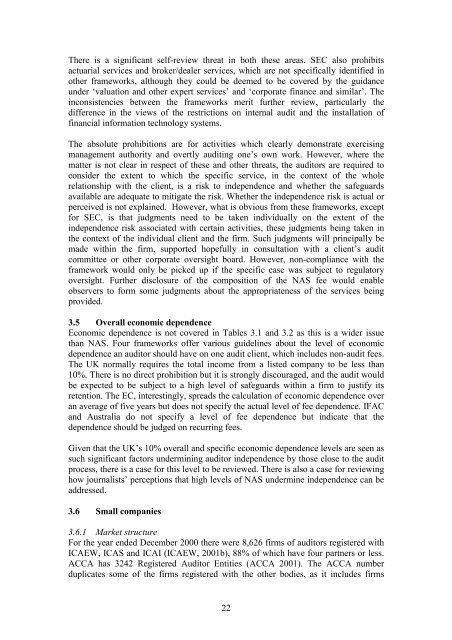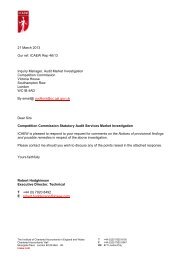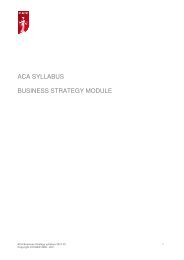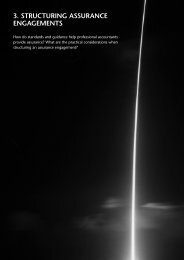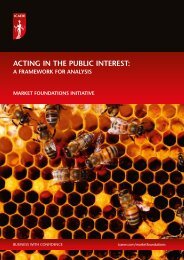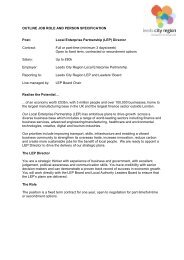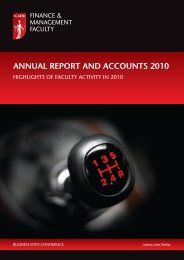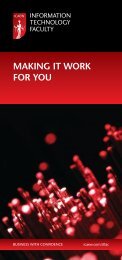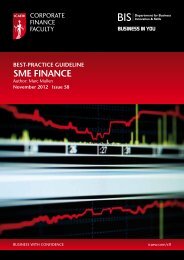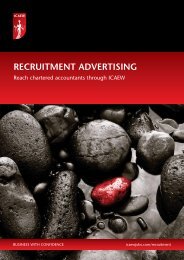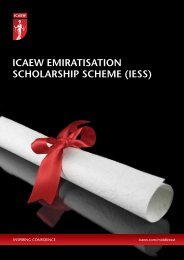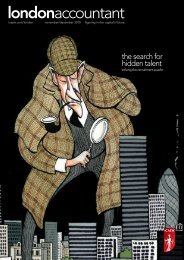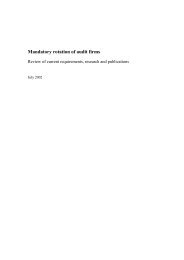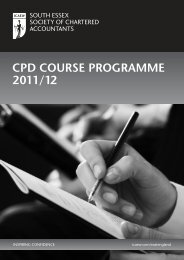Auditor independence and non-audit services - ICAEW
Auditor independence and non-audit services - ICAEW
Auditor independence and non-audit services - ICAEW
You also want an ePaper? Increase the reach of your titles
YUMPU automatically turns print PDFs into web optimized ePapers that Google loves.
There is a significant self-review threat in both these areas. SEC also prohibitsactuarial <strong>services</strong> <strong>and</strong> broker/dealer <strong>services</strong>, which are not specifically identified inother frameworks, although they could be deemed to be covered by the guidanceunder ‘valuation <strong>and</strong> other expert <strong>services</strong>’ <strong>and</strong> ‘corporate finance <strong>and</strong> similar’. Theinconsistencies between the frameworks merit further review, particularly thedifference in the views of the restrictions on internal <strong>audit</strong> <strong>and</strong> the installation offinancial information technology systems.The absolute prohibitions are for activities which clearly demonstrate exercisingmanagement authority <strong>and</strong> overtly <strong>audit</strong>ing one’s own work. However, where thematter is not clear in respect of these <strong>and</strong> other threats, the <strong>audit</strong>ors are required toconsider the extent to which the specific service, in the context of the wholerelationship with the client, is a risk to <strong>independence</strong> <strong>and</strong> whether the safeguardsavailable are adequate to mitigate the risk. Whether the <strong>independence</strong> risk is actual orperceived is not explained. However, what is obvious from these frameworks, exceptfor SEC, is that judgments need to be taken individually on the extent of the<strong>independence</strong> risk associated with certain activities, these judgments being taken inthe context of the individual client <strong>and</strong> the firm. Such judgments will principally bemade within the firm, supported hopefully in consultation with a client’s <strong>audit</strong>committee or other corporate oversight board. However, <strong>non</strong>-compliance with theframework would only be picked up if the specific case was subject to regulatoryoversight. Further disclosure of the composition of the NAS fee would enableobservers to form some judgments about the appropriateness of the <strong>services</strong> beingprovided.3.5 Overall economic dependenceEconomic dependence is not covered in Tables 3.1 <strong>and</strong> 3.2 as this is a wider issuethan NAS. Four frameworks offer various guidelines about the level of economicdependence an <strong>audit</strong>or should have on one <strong>audit</strong> client, which includes <strong>non</strong>-<strong>audit</strong> fees.The UK normally requires the total income from a listed company to be less than10%. There is no direct prohibition but it is strongly discouraged, <strong>and</strong> the <strong>audit</strong> wouldbe expected to be subject to a high level of safeguards within a firm to justify itsretention. The EC, interestingly, spreads the calculation of economic dependence overan average of five years but does not specify the actual level of fee dependence. IFAC<strong>and</strong> Australia do not specify a level of fee dependence but indicate that thedependence should be judged on recurring fees.Given that the UK’s 10% overall <strong>and</strong> specific economic dependence levels are seen assuch significant factors undermining <strong>audit</strong>or <strong>independence</strong> by those close to the <strong>audit</strong>process, there is a case for this level to be reviewed. There is also a case for reviewinghow journalists’ perceptions that high levels of NAS undermine <strong>independence</strong> can beaddressed.3.6 Small companies3.6.1 Market structureFor the year ended December 2000 there were 8,626 firms of <strong>audit</strong>ors registered with<strong>ICAEW</strong>, ICAS <strong>and</strong> ICAI (<strong>ICAEW</strong>, 2001b), 88% of which have four partners or less.ACCA has 3242 Registered <strong>Auditor</strong> Entities (ACCA 2001). The ACCA numberduplicates some of the firms registered with the other bodies, as it includes firms22


